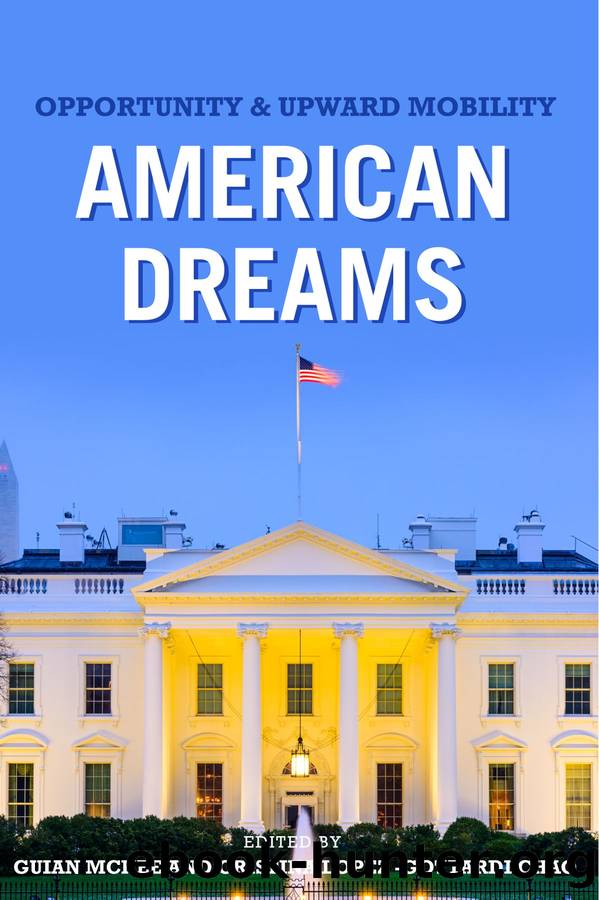American Dreams by Unknown

Author:Unknown
Language: eng
Format: epub
Tags: POL040010 Political Science / American Government / Executive Branch
Publisher: University of Virginia Press
Get Out of the Way
Once state and federal governments create a stable fiscal environment, they should get out of the way. Cities are capable of promoting economic opportunity and mobility if we just let them.
Consider the number of cities that have now adopted living-wage legislation, a policy that has been shown to reduce poverty significantly. Cities are also adopting family leave, health care, and labor-friendly legislation, in this way addressing inequality in the absence of state or federal regulation.
Economic theorists often assert that the minimum wage and other forms of social welfare regulation have to be pursued at the national level. Conventional wisdom suggests that municipal regulation will prompt businesses and residents to flee.
But that is not what has happened. Millions of Americans are now living in cities with minimum wages that will reach at least $15 an hour. The efforts by mayors and city councils in Los Angeles, New York, Chicago, Santa Fe, and hundreds of other cities have also induced some states to adopt higher minimums. Cities have been the first movers in regulating low-income service work and in providing much-needed support for low-income laborers.
Indeed, the primary barrier to cities addressing economic inequality is state and federal interference. State legislatures regularly adopt preemptive legislation that prevents cities from acting. Federal law also makes it difficult, if not impossible, for cities to adopt regulations that directly regulate labor rights or mortgage lending. Cities need more room to maneuver. The new administration can give them this policy space by avoiding unfunded mandates, by directing federal agencies to permit local flexibility in applying social welfare programs, and by providing resources directly to cities, bypassing state legislatures. Preemptive federal laws should be modified to permit cities more room to regulate in areas like labor and employment, banking, and insurance.
When cities have the authority, they can do a great deal. In analyzing local social welfare policy, urban theorist Michael Craw found that even when constrained by limited fiscal capacity, many local governments “still have a significant degree of independence in reacting to local policy preferences when it comes to decisions on providing social welfare services and participating in federal and state intergovernmental grants.” He concludes that rather than “simply being ‘junior partners’ to federal and state governments, some local governments possess considerable autonomy in addressing local poverty.”28 The political scientists Chris Tausanovitch and Christopher Warshaw recently found that “liberal” cities have higher taxes, less regressive tax systems, and spend over twice as much per capita than do “conservative” cities on social welfare.29
Despite conventional economic theory, cities are addressing inequality, and doing so aggressively. City residents are willing and able to pay taxes for redistributive social programs. And the wealth being generated in cities is being plowed back into city services.
Download
This site does not store any files on its server. We only index and link to content provided by other sites. Please contact the content providers to delete copyright contents if any and email us, we'll remove relevant links or contents immediately.
Man and His Symbols by Carl Gustav Jung(3408)
[2004] Mass Psychology (Penguin Modern Classics) by Sigmund Freud(1200)
Angel Dreams by Virtue Doreen Virtue Melissa(1189)
God's Prophetic Symbolism in Everyday Life by Adam Thompson & Adrian Beale(1178)
Dreams by C. G. Jung(1042)
Forgotten Language by Erich Fromm(1041)
Inner Work by Johnson Robert A(1006)
Mass Psychology (Penguin Modern Classics) by Sigmund Freud(1000)
Conscious Dreaming: A Spiritual Path for Everyday Life by Robert Moss(997)
12,000 Dreams Interpreted by Linda Shields(991)
Be Wise Now by Gael McCool(969)
Inner Work Using Dreams & Active Imagination For Personal Growth - Robert A. Johnson by Robert A. Johnson(966)
The Pizza Party by Theo Baker(961)
The Art Of Dreaming by Carlos Castaneda(945)
Chicken Soup for the Soul by Amy Newmark & Kelly Sullivan Walden(935)
American Dreams by Unknown(907)
The Pagan Dream of the Renaissance by Joscelyn Godwin(904)
Leopard Warrior by John Lockley(873)
Conscious Dreaming by Robert Moss(864)
